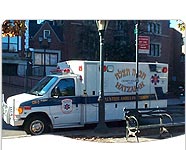 
Low-Dose Aspirin and COX-2 Inhibitors Together Increase Ulcer Risk
Reuters Health
(Reuters Health) When patients who routinely take low-dose aspirin are also treated with a COX-2 selective inhibitor, the incidence of ulcers increases to a rate comparable to that seen with nonsteroidal anti-inflammatory drugs, according to a report in the August issue of Gastroenterology.
Low-dose aspirin alone is generally associated with a significant risk of serious gastrointestinal side effects, the study found, and enteric coating does not carry a lower risk for bleeding compared with plain aspirin.
COX-2 selective inhibitors significantly decrease the risk of gastrointestinal side effects compared to nonsteroidal anti-inflammatory drugs, according to a multicenter team led by Dr. Loren Laine of the University of Southern California School of Medicine in Los Angeles. But until now, there have been no randomized trials to study the interaction of low-dose aspirin with COX-2 inhibitors, the team writes.
In the trial the researchers describe this month, 1,615 patients with osteoarthritis who were at least 50 years old were randomized to receive either placebo, enteric-coated aspirin in a dose of 81mg/day, ibuprofen in a dose of 800mg 3 times daily, or a combination of the low-dose enteric-coated aspirin and rofecoxib, 25mg/day.
After 12 weeks of treatment, the cumulative incidence of ulcers was 5.8% in the placebo group, 7.3% in the aspirin-alone group, 17.1% in the ibuprofen group, and 16.1% in the combination aspirin/COX-2 group.
In this study, the investigators point out, low-dose aspirin alone did not significantly increase the risk of ulcers.
Addition of a COX-2 selective inhibitor, however, brought the incidence of ulcers up "to a rate not significantly less than a nonsteroidal anti-inflammatory drug alone," the authors said.
None of the patients in the study were taking aspirin for cardiovascular prophylaxis. Identification of the relative impact of these agents "on gastrointestinal mucosal injury in patients taking low-dose aspirin for vascular prophylaxis will require further study," the authors conclude.
Gastroenterology 2004;127:395-402.
The above message comes from "Reuters Health", who is solely responsible for its content.
The above is for general informational purposes only. Always consult your
physician regarding specific medical issues and call Hatzalah or your local
ambulance service in the event of an emergency.
Back to Digest Index
|









